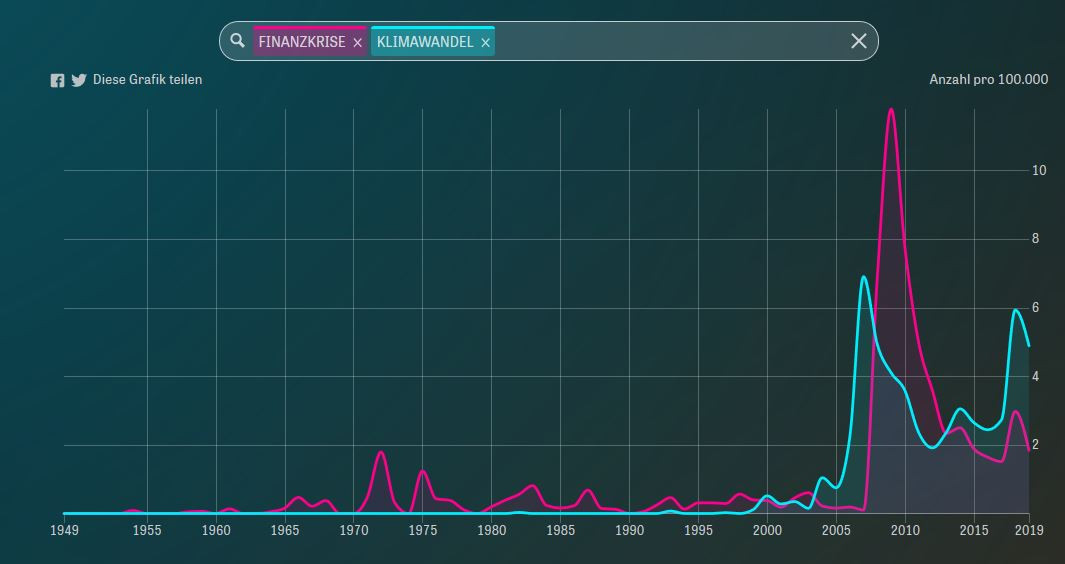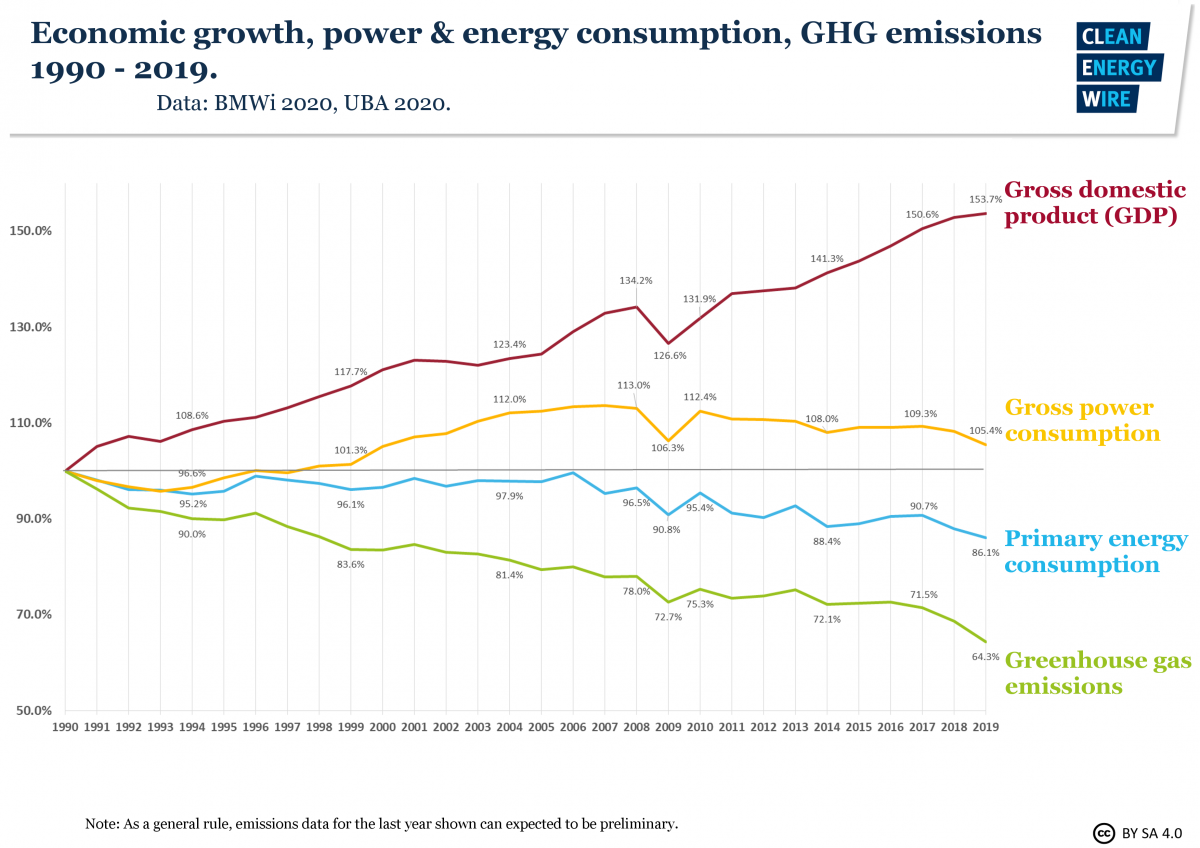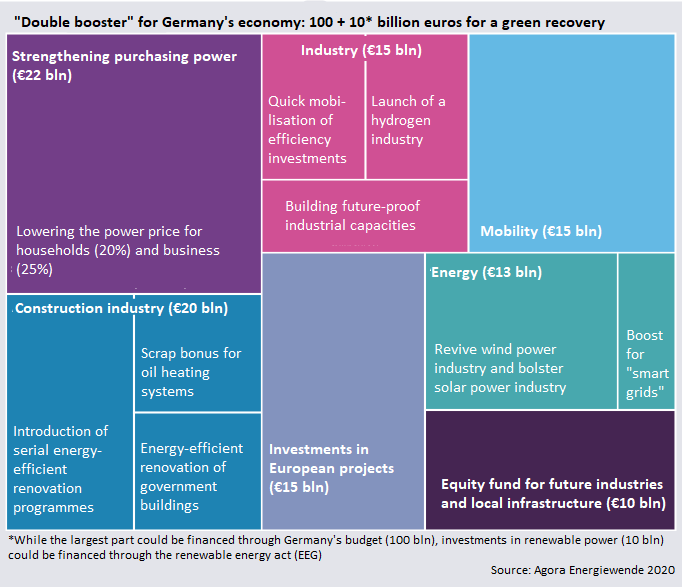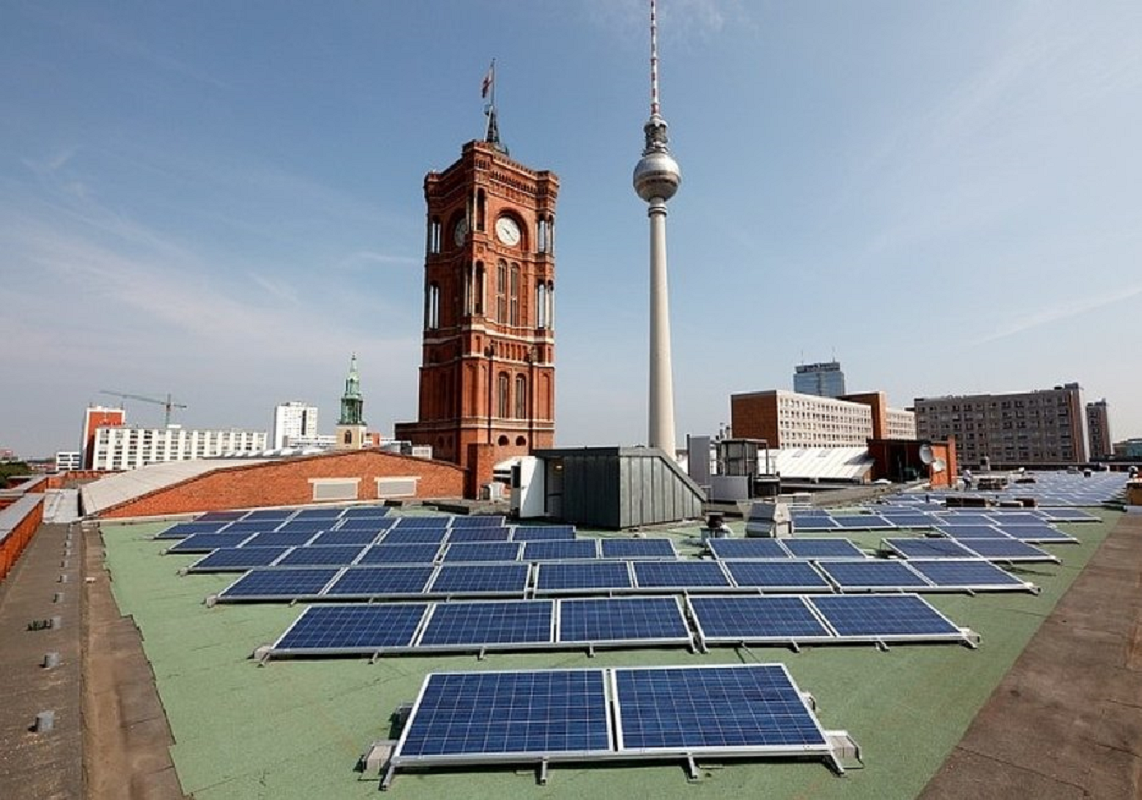Climate after corona: green stimulus package could boost the economic recovery
Policymakers, economists and environmentalists are gearing up across the globe to get plans in place to kick-start the hard-hit economy in the wake of the corona crisis with hundreds of billions in climate-friendly stimulus. While some climate activists and energy transition experts see this as a golden opportunity to drive urgently needed investment in low-carbon technologies, many also fear that money will rather flow into old industries, as lobby groups and politicians are calling for relaxed rules to ease businesses way back to normality.
Policymakers are scrambling to contain the lung disease COVID-19 that is caused by the virus and limit economic damage, with drastic lockdown measures stopping public life and letting industrial production largely ground to a halt in dozens of countries at once. Many nations have quickly announced unprecedented economic support packages, raising concerns that the response to the crisis could undermine other policy aims. How the money forked out is invested could determine the success of decarbonisation efforts long after the pandemic has been overcome.
So-called green stimulus packages are seen as a way to ensure that climate action doesn't fall prey to the pandemic, but emerges from it stronger than before. They could speed up investments that would have become necessary anyway over the course of the next decade, as Germany gradually phases out both nuclear and coal power and boosts the number of electric cars on the road. Also, they do not need to invent solutions from scratch, but can focus on sectors where environmentally-friendly alternatives are widely applicable already.
Green stimulus: what it could look like in the various areas of the economy
Potential road maps for investment already exist, including Germany's Climate Action Programme and the EU's Green Deal. Both plans touch upon almost all facets of economic activity, offering many options for policymakers to draw on when designing a long-term recovery plan. As Europe's largest economy and its most important industrial location, Germany's handling of the false dilemma between economic stability and decarbonisation will have a large impact on how well the region can launch a successful recovery in line with climate targets. Environment minister Svenja Schulze sought to give assurances that climate action will not fall behind in the crisis, saying any recovery package should be based on the goal of "creating an economy that completely rests on renewable energy sources."
"The climate policy ambitions formulated by the government in the context of its Climate Action Programme should not be relaxed even in the current situation," Karen Pittel, head of the ifo Centre for Climate, Energy and Resources in Munich told Clean Energy Wire. She said short- term support measures taken after the 2008 crisis to keep small and medium-sized companies afloat could also prove helpful in the coronavirus crisis, but should only be carried out in line with long-term goals like climate policy.
She warned that denigrating the importance of climate projects could send a dangerous signal to industries that often have to plan years ahead as they decide whether to invest in building renovations or other energy-related measures. This could prompt emissions to bounce back at even higher levels, and could make it even harder or more expensive to reach climate targets while hampering the long-term economic recovery, Pittel said.
Several states have already called for putting climate policy on the back burner, arguing that projects like the Green Deal pose additional obstacles to economic recovery. Likewise, industry associations have said tighter environmental standards could hinder their ability to react to the coronavirus crisis, calling for a relaxation of some regulations.
The pandemic is disrupting what was supposed to be a crucial year for climate action and has driven climate action from the top of policymakers' priority lists, potentially disrupting the climate-friendly transformation of critical sectors. The postponement of the COP26 UN climate summit to 2021, along with many other climate-related events, could also reduce the sense of urgency in international climate diplomacy.
In Germany, the coronavirus has halted progress on some of the country's most important climate policies, including the completion of the coal phase-out law, the introduction of carbon pricing, and urgently needed reforms to renewable energy policies. Thomas Bareiß, conservative state secretary in the economy ministry, rejected any criticism that the government is not moving fast enough to resolve key issues blocking solar and wind power expansion, arguing that there are "more urgent" matters to deal with.
Other conservatives called for suspending the aviation tax planned in Germany's Climate Action Programme for at least one year, while ro-business party FDP questioned the introduction of a national price on carbon emissions in heating and transport, a core element of the country's future climate policy. An op-ed in the conservative German news magazine Focus called environmental policies an "eco-luxury" and "money-burning mega projects" that would consume funds needed for "the truly important things."
At the European level, a Polish government official called for removing the EU emissions trading scheme (ETS) while Czech Prime Minister Andrej Babis said the European Green Deal should be scrapped altogether, as attention should be focussed on the coronavirus instead. US President Donald Trump, meanwhile, called the idea to include environmental aims in recovery packages "ridiculous," arguing they play no part in getting people back to work again.
Political support for climate action could also decline in the wake of the virus, driven by those voices who say there is no room to focus on anything except a swift economic recovery. There is a precedent for this: after the financial crisis in 2008, climate change as a topic dropped steeply in importance during debates in Germany's parliament and would not bounce back to pre-crisis levels for almost ten years.

But the International Energy Agency (IEA), has said that after immediate needs are met, the pandemic response could in fact become an "unprecedented" opportunity to steer investments into long-term economic recovery strategies based on decarbonisation. It’s an approach the German government seems to be embracing.
German Chancellor Angela Merkel said Europe will need an ambitious recovery programme after the coronavirus crisis, signalling that Germany is ready to "do its share" to achieve an internationally-coordinated economic revival once the "hardest part" of the crisis is over. "At the same time, we need to do the right thing regarding climate action, which has not disappeared as an issue," Merkel assured. Finance minister Olaf Scholz said a stimulus package oriented toward international climate targets and Germany’s goal of becoming carbon neutral by 2050 would "make sense," as soon as the most pressing phase of the pandemic has ended.
A green stimulus package would combine crisis spending to restart the economy with environmental goals in mind. Proposals include clean energy tax credits, requirements that bailed-out industries like airlines commit to emissions cuts, and investments in green infrastructure, among many others. This approach could both ensure that climate action is not neglected during the crisis, and help Germany stay competitive in energy transition technologies, a sector that could be worth about 23 trillion dollars by 2030, according to the World Bank.

Depending on how long governments must keep lockdown measures in place to slow the virus' spread, the economic damages could far outstrip the 2008 financial crisis. Germany's Council of Economic Advisors (Wirtschaftsweise) estimated that the country's gross domestic product (GDP) will shrink by up to 5.4 percent this year due to worsening credit conditions for companies, investment reluctance, supply chain disruptions, and greatly diminished household spending. Economic research institute ifo said that each additional week of lockdown measures will slash GDP by up to 1.6 percent. The European Central Bank (ECB) estimated the Eurozone economy could shrink by up to 10 percent in 2020.
Many countries quickly embarked on unprecedented economic support programmes to cushion short-term impacts and avoid long-term damage. In a first reaction, the German government set up a "protective umbrella" worth 600 billion euros and a supplementary budget worth 156 billion euros, 50 billion of which are reserved for supporting small businesses and the self-employed. These figures will likely be increased if lockdown measures and other obstacles to economic activity persist.
The European Commission has said its next long-term budget will be a new "Marshall Plan," modelled after the far-reaching stimulus packages that rebuilt Europe after the Second World War. Meanwhile, the ECB announced a 750-billion-euro pandemic emergency programme to buy up bonds and securities to avoid defaults in the Eurozone. Supplementary provisions made by the European Commission will allow member states to bypass fiscal discipline rules - a relaxation long considered a red line by countries with reputations for thrifty monetary and economic policy, such as Germany.
But traditional stimulus measures aimed at providing short-term jolts to economic activity are likely to fail this time due to the concurrent collapse in both supply and demand caused by the lockdown measures, Germany's economic advisors said. However, they stressed, households and businesses alike would benefit from "early announcements" on how the economy is supposed to get going again after constraints imposed during the pandemic have subsided.
While the social lockdown and industrial shut-downs are set to cause a significant drop in greenhouse gas emissions in 2020, experts expect CO2 output to bounce back in the eventual recovery. Think tank Agora Energiewende* estimated that Germany's 2020 CO2 output will probably fall by up to 15 percent this year. However, the think tank warned that this is likely to be a one-off event, and emissions will spike again once the economy recovers.
The same was true in the wake of the global financial crisis: after dropping by 1.4 percent in 2009, global emissions jumped 5.9 percent in 2010 while the fossil-fuel intensity of the world economy increased. Depending on the speed with which economic activity resumes after the corona crisis, the apparently inevitable 2020 recession could be followed by a rapid rebound next year, with GDP growth nearing five percent, Germany's economic advisors said. Climate-friendly projects could fall short in the recovery if uncertain investors rattled by the economic collapse shy away from in renewable power sources, energy-efficient buildings or low-carbon industries.
From the onset of the lockdown measures, environmental groups and energy market professionals therefore called for a forward-looking approach to government support for struggling businesses and initiate much-needed transformation across all sectors. "Amid the corona crisis management, we should not forget much bigger challenges for our civilisation," Germany's environmental agency UBA warned.
Global warming, resource depletion and the loss of species already put a strain on global ecosystems, the agency said, but added that the crisis response also offers a chance to review traditional business practices and aim for "a more sustainable and future-proof restart." UBA head Dirk Messner argued the coronavirus has proved that structures and behaviour that seemed immutable can in fact be altered rapidly if people accept the necessity, a lesson that could be very valuable in the much more long-term response to climate change.

Agora Energiewende proposed an investment programme worth 100 billion euros to simultaneously tackle emissions reduction challenges across different sectors and quickly encourage activities in construction, heavy industry and renewable energy production. Environmental group Germanwatch cautioned a stimulus package should be designed jointly by Germany's so-called climate cabinet, a group of ministers responsible for climate-relevant policy areas, rather than by the economy ministry alone.
Germany could do a lot to help make the European Green Deal a template for the EU's economic recovery plan, ifo's Karen Pittel said. The government could push for a swift and non-bureaucratic implementation of investment incentive programmes or forge its own alliances in the energy and transport sector. The economist warned individual companies will have a hard time deciding whether to aim for short-term security or long-term stability with regard to climate-related investments, arguing the onus would now be on the government to speak out. "Policymakers have to give a clear signal for climate policy," she said.
*Like the Clean Energy Wire, Agora Energiewende is a project funded by Stiftung Mercator and the European Climate Foundation.

